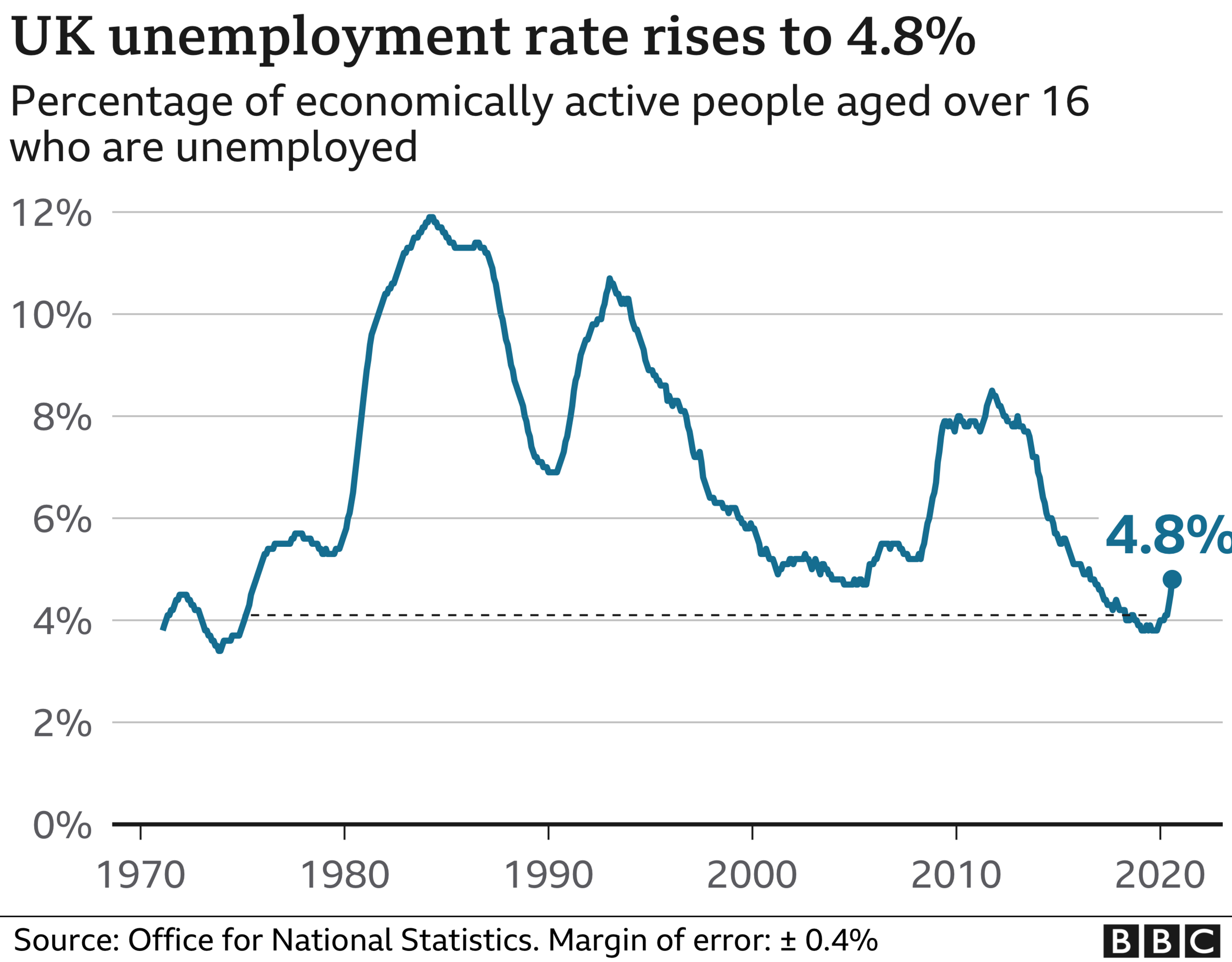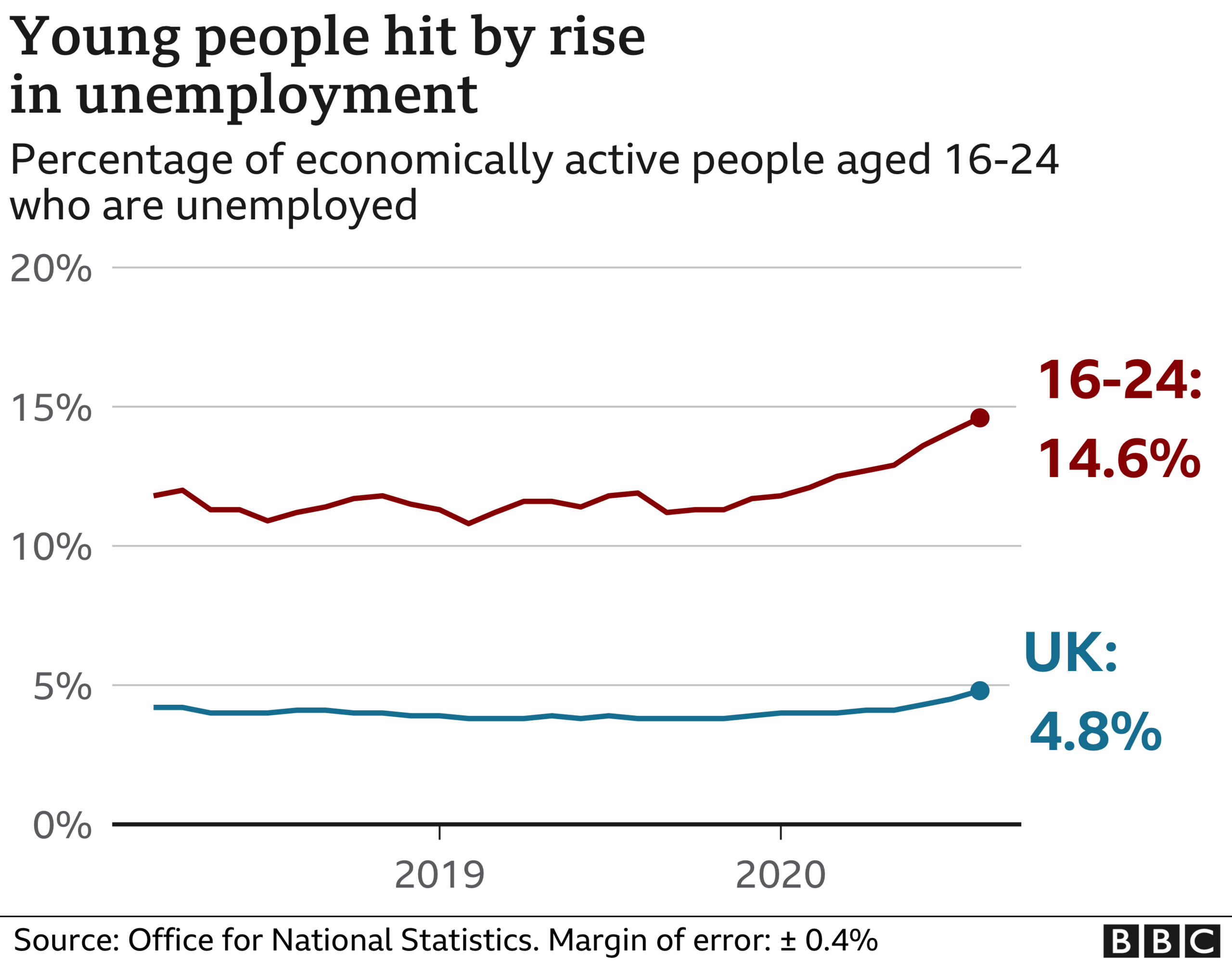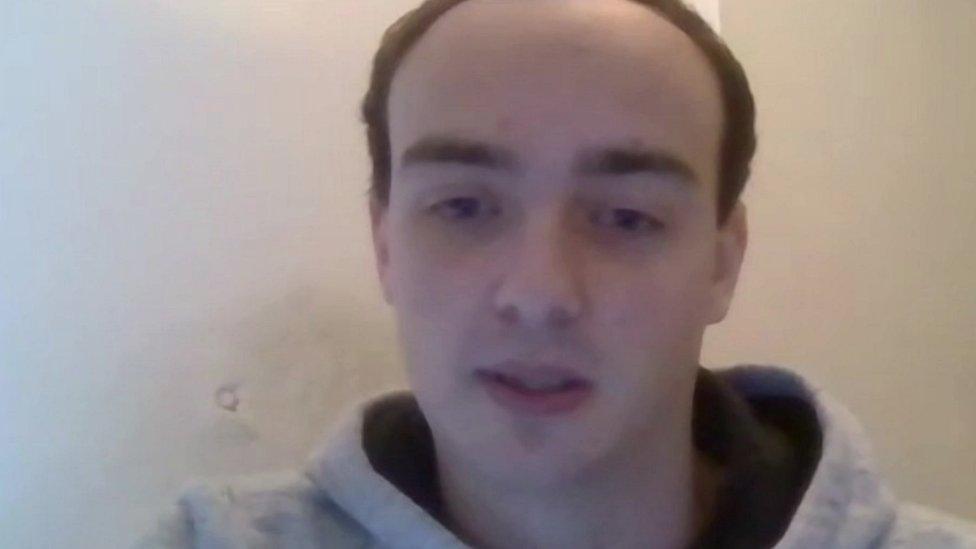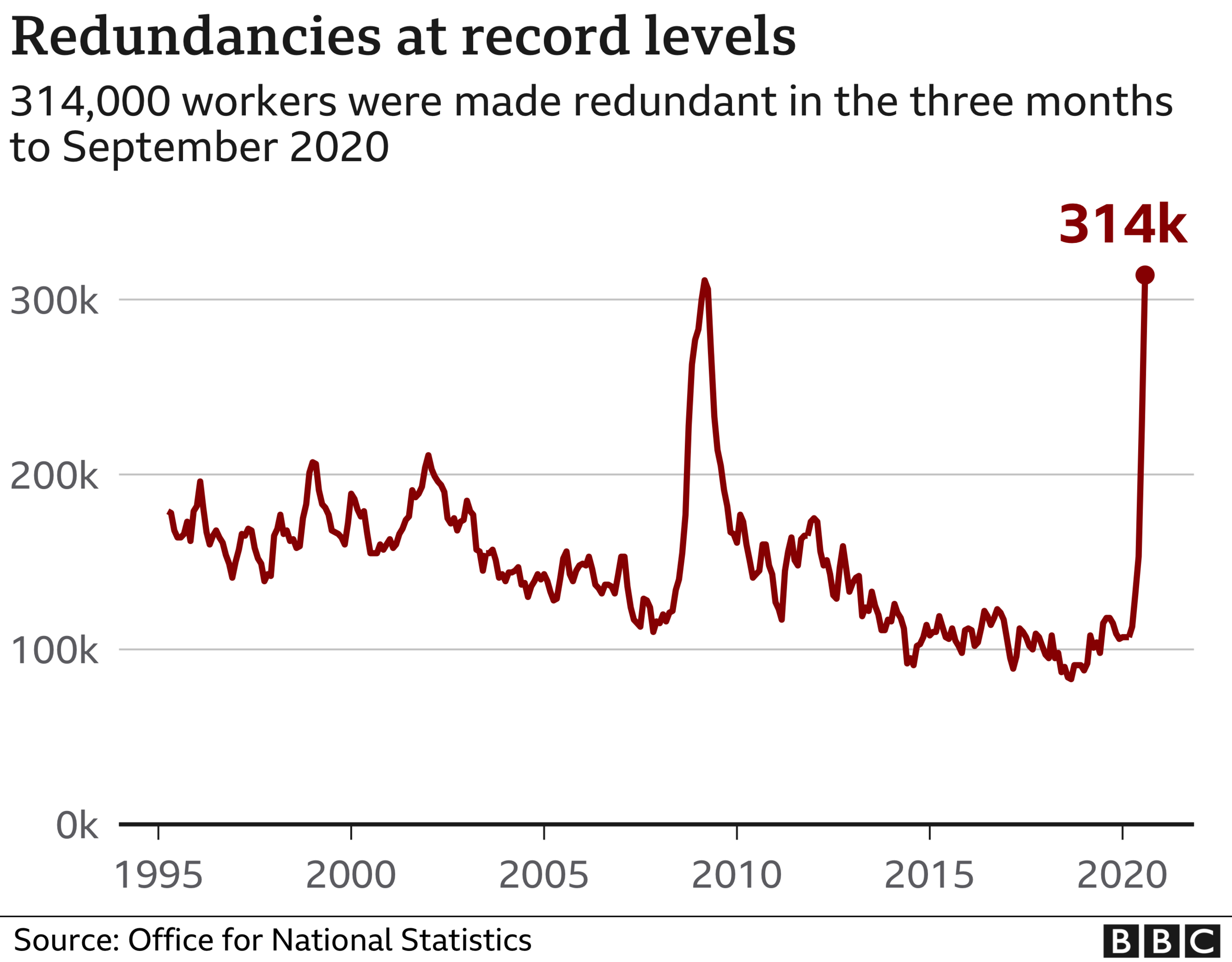UK unemployment rate continues to surge
- Published

The UK's unemployment rate rose to 4.8% in the three months to September, up from 4.5%, as coronavirus continued to hit the jobs market.
Redundancies rose to a record high of 314,000 in the same period, the Office for National Statistics (ONS) said.
Firms made more workers redundant in anticipation of the end of the furlough scheme, which was originally supposed to finish at the end of October.
It has now been extended until the end of March.
Analysts said the extension had come "too late in the day" to save some jobs and further big rises in unemployment were likely in the coming months.

How many are affected and which age group is faring worst?
The number of people out of work rose by 243,000 in the three-month period, the largest increase since May 2009.
The redundancy figure was higher, however, because it included people who may have lost their jobs and then retired or decided to stop looking for work.
The ONS figures also showed there was a big rise in the number of 16 to 24-year-olds out of work.
The unemployment rate among young people is far higher than the overall rate.

What about the bigger picture?
ONS deputy national statistician for economic statistics Jonathan Athow told the BBC: "We're seeing a continuation of a weakening of the labour market, fewer people on the payrolls and fewer people employed overall. That is now passing through to increasing unemployment altogether."
He said the UK was starting to see people fall out of work in quite large numbers. However, there were still about 2.5 million people on furlough, with "quite a lot of uncertainty" about what would happen to them.
"We might see furlough creep up again and that might mean we don't see any further big increases in redundancies or unemployment, but it's way too early to tell what will happen," he added.
Mr Athow said vacancies continued to recover from the very low numbers seen earlier in the year, but those figures predated the reintroduction of lockdown restrictions in many parts of the UK.
What do unemployed people say?

Justin Miller was made redundant as a lifeguard in July. He is a graduate who has applied for more than 100 jobs, but has not once been invited to an interview.
"I've been looking for opportunities, but I just haven't had any luck with anything I've been doing," he told the BBC.
"There's a lot of jobs out there locally with local shops, but I've been competing against other people that could have been made redundant with 10, 20 years' experience, so I've got no chance of getting those jobs.
"Most of the time I'm not even hearing anything back. It's just been really difficult," he says.
"It definitely plays on your mental health. There's a lot of thoughts that go on in your head because you've had so much rejection.
"It's a question of keeping myself motivated and not letting it get me down too much."
How do you improve your chances of finding work?

If you keep getting rejection emails, ask them why, says Claire Valoti, a boss at social media company Snap.
"Not everyone is going to give you feedback, but some will. The important thing is to figure out what's not working and how you can better sell yourself."
"Be bold," she says. Ask a recruiter or someone in your industry, since job applications and interviews are things at which you can improve, she recommends.

What are economists saying?
Tej Parikh, chief economist at the Institute of Directors, said the pandemic continued to bring "turbulence" to the UK jobs market.
"The extension of the furlough scheme through to March is welcome as it has given directors certainty to plan ahead for their staff. Unfortunately, the change appears to have come too late in the day for some."
Suren Thiru, head of economics at the British Chambers of Commerce, said: "While there was a rise in the number of job vacancies, this is more likely to reflect a temporary bounce as the economy reopened before recent restrictions were reintroduced, rather than a meaningful upturn in demand for labour.
He said the extension to the furlough scheme would safeguard a significant number of jobs in the short term.
"However, with firms facing another wave of severely diminished cashflow and revenue and with gaps in government support persisting, further substantial rises in unemployment remain likely in the coming months."

How bad is this compared with previous downturns?

Given the scale of the economic shock we've been through, the impact of the pandemic on the official unemployment rate remains mild. A level of 4.8%, encompassing 1.62 million people, is low by historic standards. And current predictions that unemployment will peak at 7-8% also look modest, given the fact that we're now in an economic double-dip of unprecedented proportions.
That won't be any consolation to the record 314,000 people made redundant from July to September. Fully informed by scientists about the risks of a second wave, Chancellor Rishi Sunak spent four months telling the nation he was against extending the furlough scheme beyond October ("I cannot save every business. I cannot save every job").
Indeed, the chancellor said in his winter economy plan in September it was "fundamentally wrong" to hold people in jobs that only exist inside the furlough and only changed his mind with hours to go. There can be no doubt that a large chunk of those people made redundant would still be in work, had their employers known the government would throw its policy into reverse at the last minute.
But with 2.5 million workers still reliant on furlough (according to the ONS), there are many more who can be glad the government executed that U-turn.

What has the political reaction been?
Chancellor Rishi Sunak said the figures underlined "the scale of the challenge" that the country was facing.
"I know that this is a tough time for those who have sadly already lost their jobs, and I want to reassure anyone that is worried about the coming winter months that we will continue to support those affected and protect the lives and livelihoods of people across this country," he added.
The government had extended the furlough scheme to protect jobs and launched the £2bn Kickstart programme to help young people, he said.
Shadow work and pensions secretary Jonathan Reynolds said people had lost their livelihoods because of the government's "failure to face up to the scale of this jobs crisis in time".
"We've had enough last-minute changes and bluster from this government," he added.
The chancellor needs to urgently provide support to those who have lost their jobs and get Britain back to work - including through a green recovery to help create hundreds of thousands of low-carbon jobs."

Have you lost your job during the past few months? Share your experiences by emailing haveyoursay@bbc.co.uk, external.
Please include a contact number if you are willing to speak to a BBC journalist. You can also get in touch in the following ways:
WhatsApp: +44 7756 165803
Tweet: @BBC_HaveYourSay, external
Please read our terms & conditions and privacy policy
If you are reading this page and can't see the form you will need to visit the mobile version of the BBC website to submit your question or comment or you can email us at HaveYourSay@bbc.co.uk, external. Please include your name, age and location with any submission.
- Published13 October 2020

- Published26 March

- Published6 November 2020

- Published29 July 2020
